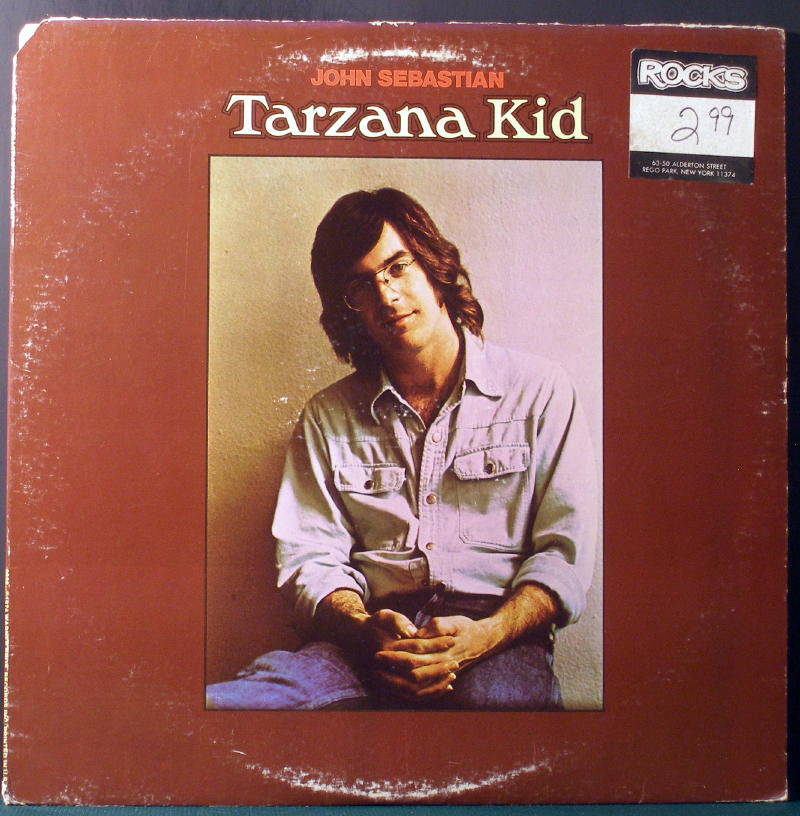| T O P I C R E V I E W |
| lemonade kid |
Posted - 10/02/2012 : 21:01:54
Face Of Appalachia...hard to imagine a better song...John is the best!
http://www.youtube.com/watch?v=Lzx3ZvxK1Ro
John played it all guitar, harmonica, wrote and sang..and sat in on so many albums ...from the Doors to Fred Neil..a legend.

LINER NOTES FOR JOHN SEBASTIAN'S TARZANA KID
By Richie Unterberger
Over the course of John Sebastian's first three solo albums (all reissued on CD by Collectors' Choice Music), he'd used a variety of approaches. His debut, John B. Sebastian, was done with different combinations of musician friends he'd long admired. The live Cheapo Cheapo Productions Presents Real Live was comparatively sparse, the arrangements featuring only acoustic guitar, piano, and a bit of guitar-bass. The Four of Us stuck to the most part to a core group of players, those being Sebastian, keyboardist Paul Harris, drummer Dallas Taylor, and bassist Kenny Altman. John had hoped to make them his own band, but Harris and Taylor joined Manassas. So for Tarzana Kid, he was back to using a rotating cast of supporting players, although Altman remained aboard as bassist.
Though the previous three albums had been produced by John's friend Paul Rothchild, Tarzana Kid would be co-produced by Sebastian and Lovin' Spoonful producer Erik Jacobsen, with whom John had fallen out for a while after the Spoonful broke up. "I was realizing that a lot of things had gone down that were big mistakes," says Sebastian today of his reunion with Jacobsen. "I think that we were beginning to outgrow some of those childish reactions that we'd had to the uncomfortable situations we were put in. Having that freedom, it just felt more possible for me to engage Erik."
Several of the musicians enlisted for Tarzana Kid not only had quite illustrious credentials, but were well known as artists in their own right. The Pointer Sisters sang on "Friends Again," as did Lowell George of Little Feat and Emmylou Harris on "Dixie Chicken." George also added slide guitar and harmony vocal to "Face of Appalachia" (co-written by him and Sebastian), which also featured David Grisman (who'd been a part of the Even Dozen Jug Band with Sebastian back in the pre-Lovin' Spoonful Days) on mandolin and David Lindley on fiddle. Ry Cooder played slide guitar and mandolin on "Wild About My Lovin'," and Phil Everly sang background vocals on "Stories We Could Tell" (which had been recorded by the Everly Brothers on their 1972 album of the same name). Plus Jim Gordon, late of Derek & the Dominos, drummed on a few tracks.
"The idea was because I didn't have a group, I should take advantage of not having a group and let the tune determine the player," declares Sebastian. "So some of those little interludes, like where we're playing 'Wild Wood Flower'—that was an opportunity to take a guy I knew [David Grisman, who also plays mandolin on that track]; I knew his talents." John also reserves special praise for a few players who might not be as well known to the public as the names in the preceding paragraph, but made major contributions to Tarzana Kid, such as guitarist Amos Garrett, who'd put his mark on country-rock as part of Great Speckled Bird with Ian & Sylvia. "He may not have been that well known in the bigger circles, but [Lovin' Spoonful guitarist] Zal Yanovsky regarded this guy as the ****," points out Sebastian. As for pedal steel player Buddy Emmons, with whom he had worked back on John B. Sebastian, "He really represented the big kids, to me. Buddy Emmons warming up is better than most guys playing at the top of their game."
With so many skilled singers and instrumentalists pitching in, it's unsurprising that Tarzana Kid travels across a considerable range of rock and folk combinations, though this eclecticism had been a constant feature in Sebastian's work. The singer-songwriter had a rather overlooked eye for ethnic styles that were not widely known in the US in the early 1970s, using a steel band from Trinidad on his 1971 LP The Four of Us, which also included a cover of a tune by then-obscure zydeco giant Clifton Chenier. Tarzana Kid's opening track, a cover of Jimmy Cliff's "Sitting in Limbo" (featured in the classic 1972 movie The Harder They Come), was a pretty adventurous move at a time when reggae was just starting to make inroads into the American consciousness.
"This just shows that L.A. at that time still had echoes of this wonderfully wide-open musical atmosphere," comments Sebastian. "You'd hear different styles on one radio station, multiple cultural ideas; it's a great thing. I think we'd all heard the Harder They Come album, and it had kind of resonated with some of us. And I had had so much of this feeling of sitting in limbo, especially in these album endeavors"—a reference to Sebastian's stint at Reprise Records, where his career was losing momentum as his style fell out of fashion with the times, and the commercial performance of his LPs was sometimes plagued by delays and business hassles. "So it had something to do with it, I guess."
Certainly one of the most noted tracks on Tarzana Kid was "Dixie Chicken," which guest guitarist Lowell George had previously recorded as part of Little Feat on the 1973 album of the same name. "Lowell and I had had this 20-minute idea where he, I, and Phil Everly were gonna get together and sort of be part of Little Feat," he explains. "Now, people blow this idea out of proportion. I don't want to make it seem like anything that it wasn't. This was an idea that maybe lasted a week and involved one rehearsal before the other guys in the band went, 'What the **** are you talking about?,' and [got] back to the Little Feat central idea again. But it had given Phil Everly and I this opportunity to kind of get in there with Lowell. Also, we had access to these rehearsals where Lowell would play whatever the new tunes were, and one of the new tunes the day we were there was 'Dixie Chicken.' I was so knocked out by the way the band was playing."
Continues John, "Then the tune went into the studio and got the studio massage, which is always a different thing than how we start off playing it instinctively. By the end of it, I felt like they'd lost part of the syncopation, this rock'n'roll rumba idea. Once everybody started playing it in the studio, really wanting to do it the very, very best or the hardest that anybody'd ever done it, it flattened a little bit. It didn't have the same syncopation. Normally, I don't think I'd do another version of a tune that a guy had done that well. But I wanted to remind Lowell of the way that he'd done it, with its original [feel]. I think it was just looser and more syncopated."
Though much of the material on Tarzana Kid was written by Sebastian and structured as fairly conventional songs, there was also room for unexpected covers and tracks that came together spontaneously in the studio. "Singing the Blues" (a #1 hit in 1956 for Guy Mitchell), for instance, "might have been Erik Jacobsen's idea," muses John. "Remember, this Tarzana Kid project was very much Erik and I having a chance to do what we had done during the Spoonful, which is just to stare off into the middle distance and throw out tune ideas. 'Yeah, what would it be like if we did more of a bluegrass version of blah-blah-blah?' That's how the Little Feat idea got going, [and] the 'Dixie Chicken' idea got going." Paced by John's harmonica, the closing instrumental "Harpoon" grew out of "playing with the foursome that was the essential road band," with drummer Kelly Shanahan and guitarist Ron Koss, hailed by John as a "great soulful rhythm guitarist and blistering lead guy, but he was also a great support guitarist. I wish I could have used more of what he did well. That's one of the tunes we would play to loosen up and get to where we felt like we were all in sync, because it did have some hitches to it. You kind of had to be listening. So it started out as a thing that we would play, getting a soundcheck together, and it kind of came out of it."
With Tarzana Kid failing to make the charts, it looked as though Sebastian's time with Reprise might be drawing to a close, with neither he nor the label too enthusiastic to continue the association. An unexpected hit would change all that, and generate one final Reprise LP—a story told on Collector Choice Music's reissue of the 1976 album Welcome Back. -- Richie Unterberger

Get it if you can....
________________________________________________
We are raised to honor all the wrong explorers & discoverers-
-thieves planting flags, murderers carrying crosses.
Let us at last praise the colonizers of dreams.
-Peter S. Beagle 1973
|
|
|


